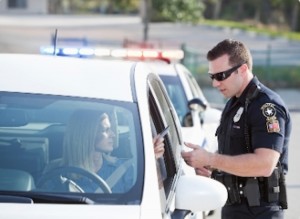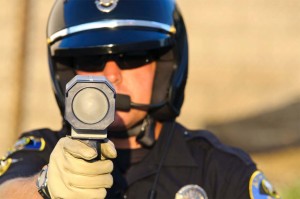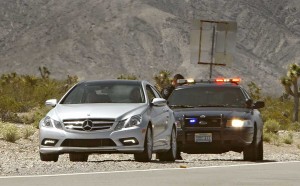The next time you get pulled over for speeding and are looking for a way to get out of the pricey citation, simply ask for a warning.
According to a new study by CarInsurance.com, 41% of the time speeders ask for leniency, friendly men and women blue grant it. The flip side is that 17% of officers write that ticket anyway. However, if you ask more men (25%) than women (7%) get the ticket.
Getting out of a speeding ticket is prudent because the effect on your checking account is going to be quick and impactful. Car insurance rates increase between 22% and 30% on average; however, depending upon where you live and the type of ticket issued, it can be much higher.
(Auto Insurers Hammering Distracted Driving)
For example, California has the highest car insurance rate increases for drivers who get a ticket for traveling between 11 to 16 mph over the speed limit. California drivers caught speeding pay on average 34% higher rates.
Michigan, which has the highest average insurance rates in the country, rates jump 29% on average for drivers caught going 11 to 16 mph over the speed limit. Caught doing more than than that? Bad news in the Great Lake State as aa driver going more than 30 mph over is likely to see an average increase of 70%.

Want to get out of a ticket? Ask the officer for a warning. It works 41% of the time, a new study claims.
However, higher insurance rates aren’t the deterrent many might think. Most motorists speed at times despite the potential rate increase:
- 82% of those surveyed acknowledge driving over the speed limit by as much as 15 mph
- 15% say they drive 16 to 29 mph over the speed limit
- 3% of people admit driving more than 30 mph over the limit
Although the study shows that asking for mercy is the most effective way of getting out of a speeding ticket, drivers offer up a variety of excuses hoping to get the ticket waived. The most common reasons given for speeding are:
- 24% claim they didn’t realize they were speeding
- 18% say they are late for work
- 14% remark that they were going as fast as everyone else
- 11% blame being late to pick up or drop off a child
- 11% tell police there is a medical emergency
- 11% say they didn’t see a speed limit sign
- 9% offer that they have to use the bathroom
(Increased Speed Limits Results in Increased Deaths, IIHS Says)
A whopping 82% acknowledged driving over the speed limit by as much as 15 mph. Another 15% said they drive 16 to 29 mph over the speed limit. Even 3% of people admitted driving more than 30 mph above the limit.
Why do drivers speed? 36% said to arrive on time; 27% said everyone else does it; 17% said it’s safe to speed as long as it’s less than 20 mph above the speed limit.
How often do they speed? 49% said they speed, but it’s rare and 38% said they almost always speed but only between 5 and 10 mph over the limit.
(Pedestrian, Bicyclist Deaths Rise in 2018)
Where do they speed? 71% said it’s OK to speed on the highway and 11% said they’re OK with speeding on residential streets. Weather conditions also play a role in speeding. Twenty-eight percent said a sunny day with dry roads is an OK day to speed.



A high percentage of drivers are “speeding” by modest amounts on collector, arterial, highway, and freeway roads because the posted limits are improperly and sometimes less-safely set well below the safest 85th percentile speeds of free flowing traffic under good conditions. Example: If the slowest 85% of the cars are at or below 45 mph on a multi-lane urban arterial, the safest limit to post that usually produces the fewest accidents is 45 – NOT lower. Far too many speed limits are posted for political reasons, not using traffic safety engineering principles.
James C. Walker, National Motorists Association
The real reason people speed is because nearly all Speed Limits are set too low. And one can be certain, those people who are cited for Speeding are involved in less traffic accidents than drivers who obey the Limit. In Germany, drivers who routinely travel 100MPH or more are involved in far fewer accidents than those who travel 75MPH or less. Why? Because faster drivers are much more alert and aware of their surroundings. They are not fooling with the radio or involved in a conversation with passengers. One of the facts Governments and the Insurance Industry keep secret is, only slightly over 1,5% of accidents are caused by someone driving over a Speed Limit – not the 25-35% claimed. How is breaking a Speed Limit shown to be the cause of so many accidents? By skewing the numbers. If an accident is caused because a driver runs a stop sign or fails to yield right-of-way, speed is always reported as a factor. If profits from speeding tickets were not in the multi-billions of dollars each year, things would be different.